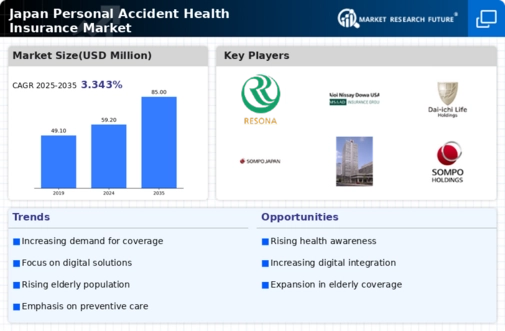Rising Awareness of Health Risks
The increasing awareness of health risks among the Japanese population is a pivotal driver for the personal accident-health-insurance market. As individuals become more cognizant of potential health issues, they are more inclined to seek insurance solutions that provide comprehensive coverage. This trend is reflected in a survey indicating that approximately 70% of respondents consider health insurance essential for financial security. The growing prevalence of lifestyle-related diseases further amplifies this awareness, prompting consumers to prioritize health insurance as a safeguard against unforeseen medical expenses. Consequently, the personal accident-health-insurance market is likely to experience heightened demand as individuals seek to mitigate financial risks associated with health-related incidents.
Government Initiatives and Regulations
Government initiatives aimed at promoting health insurance coverage significantly influence the personal accident-health-insurance market. In Japan, the government has implemented various policies to encourage citizens to obtain health insurance, including tax incentives and subsidies. These measures are designed to enhance accessibility and affordability, thereby increasing the number of insured individuals. Recent data suggests that approximately 90% of the population is covered by some form of health insurance, indicating a robust regulatory framework. Such government support not only fosters a culture of insurance but also stimulates growth within the personal accident-health-insurance market, as more individuals recognize the importance of safeguarding their health.
Aging Population and Increased Healthcare Needs
Japan's aging population presents a significant driver for the personal accident-health-insurance market. With a substantial portion of the population over the age of 65, there is a corresponding rise in healthcare needs and associated costs. This demographic shift necessitates a greater focus on health insurance products that cater to the unique requirements of older adults. Data indicates that individuals aged 65 and above account for nearly 30% of total healthcare expenditures in Japan. As the demand for specialized healthcare services grows, the personal accident-health-insurance market is likely to expand, offering tailored solutions that address the complexities of aging and health management.
Economic Factors and Consumer Spending Patterns
Economic factors play a crucial role in shaping the personal accident-health-insurance market. As Japan's economy experiences fluctuations, consumer spending patterns directly impact the demand for health insurance products. In times of economic growth, individuals are more likely to invest in comprehensive insurance plans, while economic downturns may lead to a preference for basic coverage. Current data indicates that approximately 40% of consumers are willing to pay higher premiums for enhanced coverage during prosperous economic conditions. This correlation between economic stability and insurance purchasing behavior suggests that the personal accident-health-insurance market is sensitive to broader economic trends, influencing its growth trajectory.
Technological Advancements in Insurance Delivery
Technological advancements are reshaping the landscape of the personal accident-health-insurance market. The integration of digital platforms and mobile applications facilitates easier access to insurance services, enhancing customer experience. Innovations such as telemedicine and online claim processing streamline operations, making it more convenient for consumers to manage their health insurance needs. Recent statistics reveal that over 60% of policyholders prefer using digital channels for insurance transactions. This shift towards technology-driven solutions not only improves efficiency but also attracts a younger demographic, thereby expanding the customer base within the personal accident-health-insurance market.

















Leave a Comment